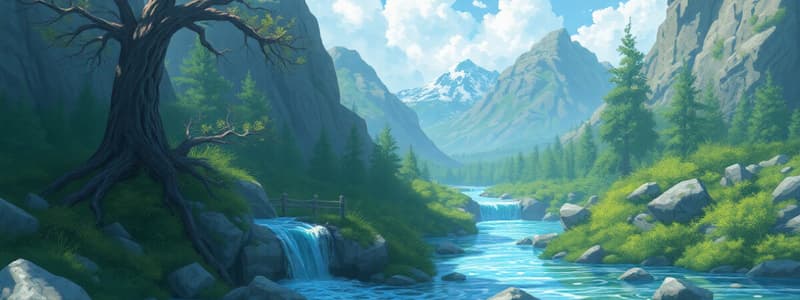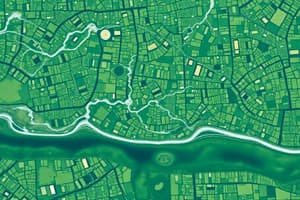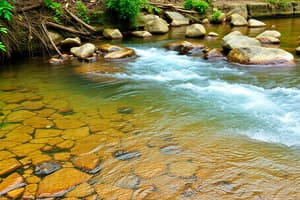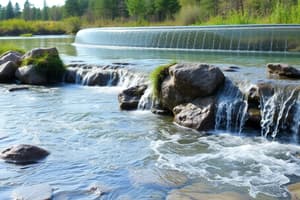Podcast
Questions and Answers
List three common uses of water.
List three common uses of water.
To drink, for food, and for cleaning.
What percentage of the planet's water is fresh water?
What percentage of the planet's water is fresh water?
3%.
What is the main reason that water isn't consumed entirely?
What is the main reason that water isn't consumed entirely?
The water cycle.
Name one factor that affects the water cycle.
Name one factor that affects the water cycle.
What does the lithosphere represent in the water cycle?
What does the lithosphere represent in the water cycle?
What is a basin in the context of hydrographic networks?
What is a basin in the context of hydrographic networks?
How does temperature influence dissolved oxygen levels in water?
How does temperature influence dissolved oxygen levels in water?
What role do divides play in hydrographic networks?
What role do divides play in hydrographic networks?
What are sub-networks in relation to larger freshwater networks?
What are sub-networks in relation to larger freshwater networks?
How does salinity affect aquatic organisms?
How does salinity affect aquatic organisms?
What is salinity, and how does it differ between seawater and freshwater?
What is salinity, and how does it differ between seawater and freshwater?
What is groundwater, and how does it collect?
What is groundwater, and how does it collect?
What is the approximate density of seawater compared to freshwater?
What is the approximate density of seawater compared to freshwater?
At what temperature does seawater freeze, and how does this compare to freshwater?
At what temperature does seawater freeze, and how does this compare to freshwater?
Define an Ice Age and state when the last Ice Age occurred.
Define an Ice Age and state when the last Ice Age occurred.
Why is understanding the differences between seawater and freshwater important?
Why is understanding the differences between seawater and freshwater important?
What percentage of the Earth's landmass was covered by glaciers during the last Ice Age?
What percentage of the Earth's landmass was covered by glaciers during the last Ice Age?
What is one consequence of the higher salinity in seawater?
What is one consequence of the higher salinity in seawater?
How much has the average global temperature risen over the last century?
How much has the average global temperature risen over the last century?
What trend is observed regarding glacier melt in recent years?
What trend is observed regarding glacier melt in recent years?
Flashcards
Water Cycle
Water Cycle
The process where water constantly changes states between liquid, gas/vapor, and solid, driven by evaporation and condensation.
Water Vapor
Water Vapor
The gaseous state of water in the atmosphere, playing a crucial role in the water cycle.
Lithosphere
Lithosphere
The solid part of the planet, including rocks and soil, which interacts with the water cycle.
Hydrosphere
Hydrosphere
Signup and view all the flashcards
Atmosphere
Atmosphere
Signup and view all the flashcards
Groundwater
Groundwater
Signup and view all the flashcards
Glacier
Glacier
Signup and view all the flashcards
Ice Age
Ice Age
Signup and view all the flashcards
Temperature Increase
Temperature Increase
Signup and view all the flashcards
Glacier Melt
Glacier Melt
Signup and view all the flashcards
Salinity
Salinity
Signup and view all the flashcards
Density
Density
Signup and view all the flashcards
Freezing Point
Freezing Point
Signup and view all the flashcards
Why is Seawater Saltier?
Why is Seawater Saltier?
Signup and view all the flashcards
How Salinity Affects Properties
How Salinity Affects Properties
Signup and view all the flashcards
What is a basin?
What is a basin?
Signup and view all the flashcards
What are sub-networks?
What are sub-networks?
Signup and view all the flashcards
What is a divide?
What is a divide?
Signup and view all the flashcards
What is salinity?
What is salinity?
Signup and view all the flashcards
What is temperature?
What is temperature?
Signup and view all the flashcards




